A Mexican drug cartel known for gruesome public slaughtering drained $40 million from Americans, and stole many elderly victims’ life savings without a drop of blood in 2022, according to FBI stats.
It’s part of a rapidly evolving timeshare scam run by the Jalisco New Generation cartel (CJNG) that is becoming more intricate, and is now estimated to be stealing hundreds of millions from Americans each year.
It started as a small operation in the Puerto Vallarta area and expanded to popular tourist spots like Cancun, according to the U.S. Treasury, which issued sanctions against seven fugitives and 19 Mexican companies connected to the scam last April.
“CJNG uses extreme violence and intimidation to control the timeshare network, which often targets elder U.S. citizens and can defraud victims of their life savings,” Secretary of the Treasury Janet Yellen said in November. “The Treasury remains committed to the Administration’s whole-of-government effort, in coordination with our partners in Mexico, to disrupt CJNG’s revenue sources and ability to traffic deadly drugs like fentanyl.”
TROPICAL RESORTS POPULAR WITH AMERICANS NO LONG ‘OFF LIMITS’ FOR CARTEL KILLERS: ‘THE RULES HAVE CHANGED’

Aerial view of a beach in Cancun, Mexico, on March 28, 2020. (Elizabeth Ruiz/AFP via Getty Images)
The Courier Journal followed a decade-long journey through the cartel’s layered scheme that cost one man just shy of $1.8 million.
The initial lure was a healthy profit from his timeshare. After years of being scammed, the cartel came back with promises of reimbursement from a seemingly legitimate Mexican lawyer filing a class action lawsuit that kept the man hooked.
KIDNAPPING IN MEXICO USED TO BE A BUSINESS. NOW THERE’S ‘NO CODE’ CURBING RUTHLESSNESS: EXPERT
The callers, whom the news report noted spoke perfect, accent-free English, continued their ceaseless pursuit for decades, with years-long stretches of silence.
By the end of the situation involving just this one victim, there were 99 wire transfers, more than 150 people involved and at least 12 Mexican bank accounts, according to the Courier Journal.
“It’s almost like an addiction,” said Stephen, who asked the Louisville newspaper to only identify him by his first name because he didn’t want his employer to know. “I kept thinking the next person was going to help me get out of it.”

Mexican marines escort alleged traffickers past weapons and drugs seized from the cartel on June 9, 2011, in Mexico City. (Yuri Cortez/AFP via Getty Images)
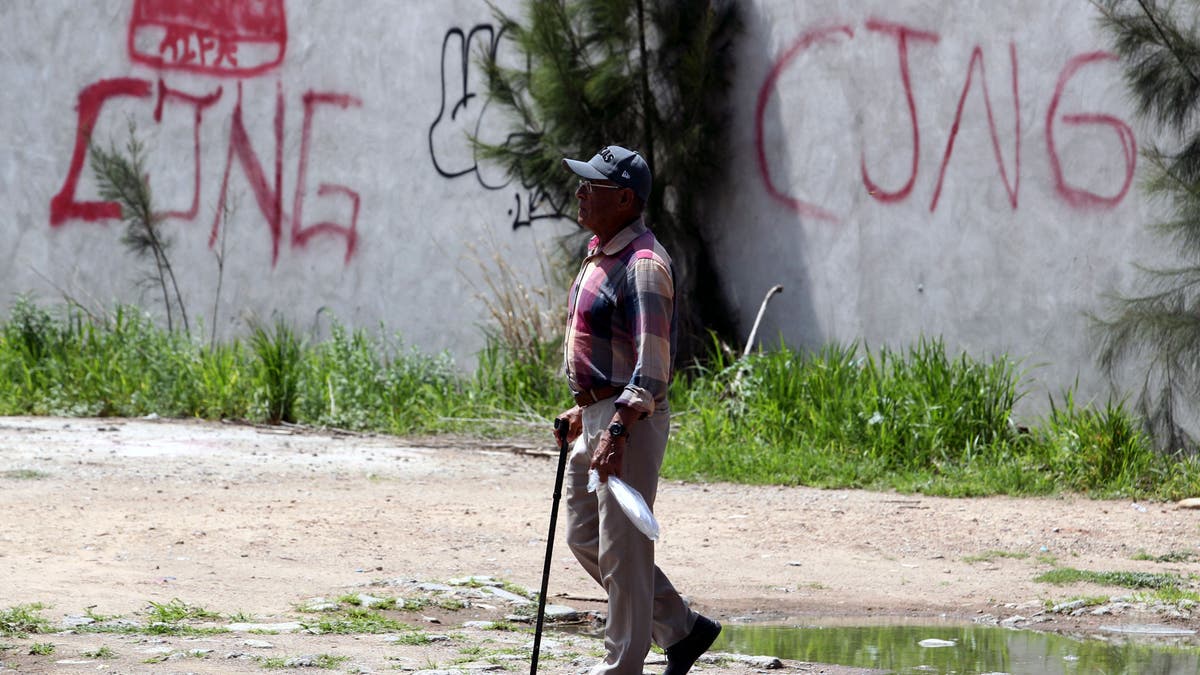
The initials of the drug cartel “Jalisco Nueva Generacion” (CJNG) are seen in graffiti on a wall in Lagos de Moreno, Mexico, on Aug. 29, 2023. (Ulises Ruiz/AFP via Getty Images)
The cartel scams hit FBI’s radar
The FBI said in a March 2023 warning that owners of timeshares in Mexico are being targeted at an alarming rate.
In 2022, the bureau received over 600 complaints with losses of about $39.6 million in 2022 from victims contacted by scammers in Mexico.
The FBI did not immediately respond to Fox News Digital’s request for comment and updated information.
AMERICAN KIDNAPPED IN MEXICO, LEFT TO DIE IN JUNGLE WITH EYES, WRISTS TAPED

Americans with ties to timeshares in Cancun and other Mexican locations have been targeted by cartels. (iStock)
“The sales representatives often use high-pressure sales tactics to add a sense of urgency to the deal,” the FBI said. “Timeshare owners who agree to sell are told they must pay an upfront fee to cover anything from listing and advertising fees to closing costs.
“Once the fee is paid, timeshare owners report the company becomes evasive – calls go unanswered, numbers are disconnected, and websites are inaccessible, or the company creates additional fees that victims are required to pay before the real estate transaction becomes final.”
Years go by, and some victims – like in Stephen’s case, which was detailed in the Courier Journal’s report – the scammers act like they are from bogus recovery companies or lawyers dangling promises of restitution.
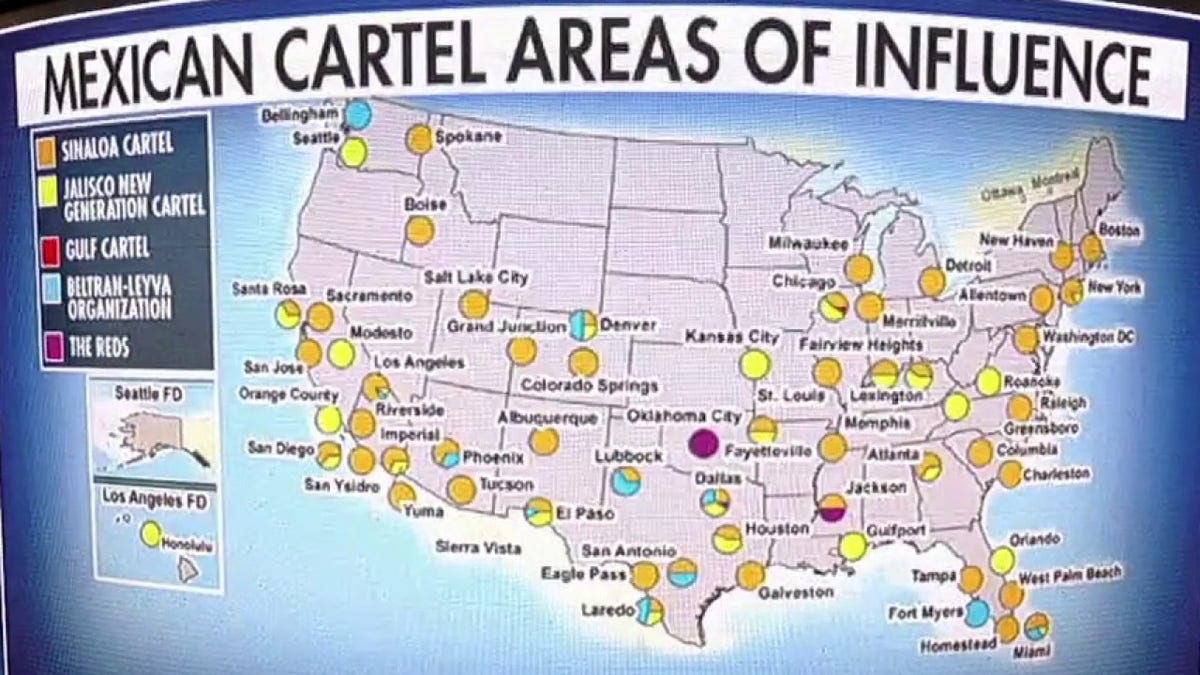
Graphic shows cities where cartels have a hold. (Fox News)

A truck burns on a street in Culiacan on Jan. 5, 2023, after Mexican security forces captured Ovidio Guzmán and one of the sons of former Sinaloa cartel boss Joaquín “El Chapo” Guzmán in an operation that set off gunfights and roadblocks across the city. (AP Photo/Martin Urista)
Mexican Army dismantles small operation after US Treasury sanctions, Mexican workers slaughtered
A month after the FBI’s warning – on April 27, 2023 – the U.S. Treasury levied its first of three sanctions in a seven-month span as part of a federal crackdown on the cartel’s scam.
Last November, the treasury hit the cartel’s fraud network for the third time, with a fresh set of sanctions against three Mexican criminals and 13 Mexican companies, bringing the total to 40.
SINALOA CARTEL MEMBERS SEND PICS OF DEAD MEXICAN POLICE AND WITNESSES: ‘THIS IS WHAT HAPPENS TO SCUM/SNITCHES’
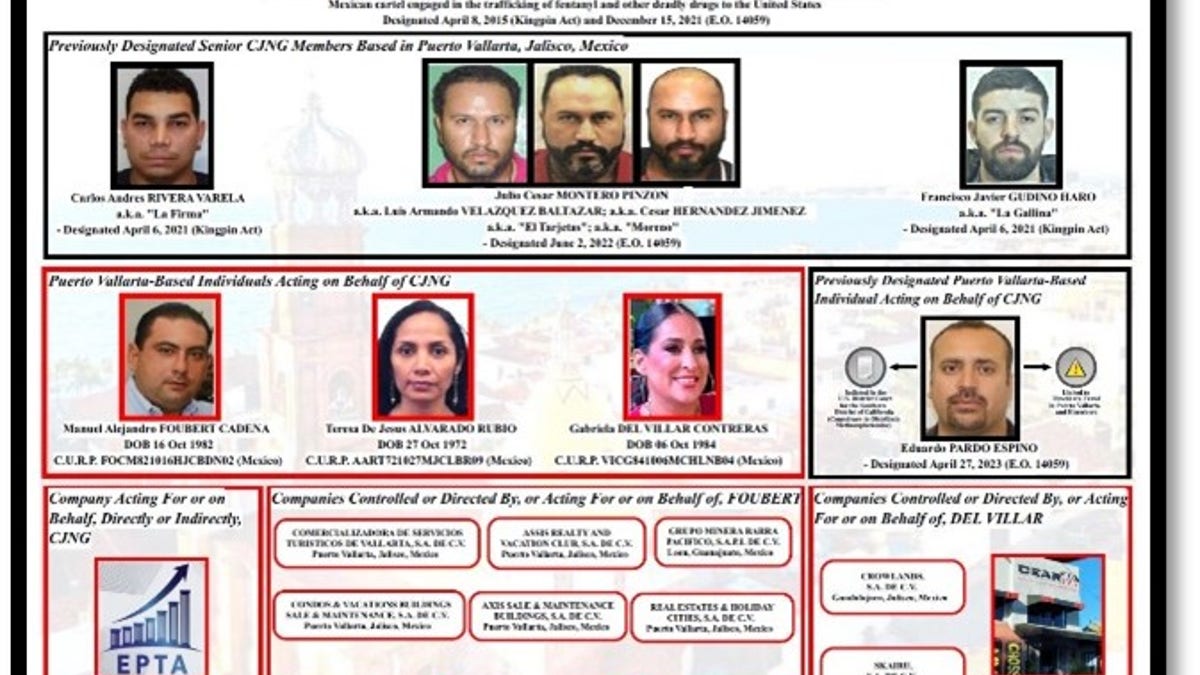
U.S. Treasury sanctions against the Cartel de Jalisco Nueva Generacion (CJNG) cartel. (U.S. Treasury)
The sanctions froze assets that are in the U.S. and banned American citizens and businesses from dealing with any of the listed companies and fugitives.
Many of the sanctions’ targets are located in Puerto Vallarta, Jalisco, which is one of CJNG’s strategic strongholds for drug trafficking.
“The CJNG cartel, a leading trafficker of narcotics like illicit fentanyl into the United States, generates substantial revenue for its multi-faceted criminal enterprise through its timeshare fraud network,” Yellen said in a November 2023 statement.
WATCH: VIDEO OF SHOOTOUT BETWEEN CARTELS AND MEXICAN AUTHORITIES
The cartel’s lucrative criminal enterprise that rivals the drug trade doesn’t come without bloodshed to Mexican citizens.
Hacked-up body parts of at least eight Mexican workers, who were all under 30 and tried to quit jobs at an illegal call center, were found in plastic bags in June 2023, The Associated Press reported.
MEXICAN OFFICIALS SAY 45 BAGS OF HUMAN REMAINS RESEMBLE MISSING CALL CENTER
“Best guess is these kids had decided they wanted out of the business,” a U.S. official told AP under the condition of anonymity, adding the cartel was “sending a message to other defectors.”
“It appears this has happened before,” the official added.

Search team in Mexico. (Jalisco Prosecutor’s Office)
On Dec. 29, 2023, Mexican law enforcement and the Mexican Army dismantled illegal internet antennas in Buenavista, according to the attorney general of the Mexican state of Michoacán.
“Illegal internet antennas were disabled, used by a criminal cell for commercial purposes, under threats and excessive costs to the population,” the Mexican Attorney General’s Office said in a translated Facebook post.
“During the incident, a person allegedly connected to the crimes was arrested.”
But that’s virtually nothing to the far-reaching operation that’s grown in size, complexity and intricacy since 2010.
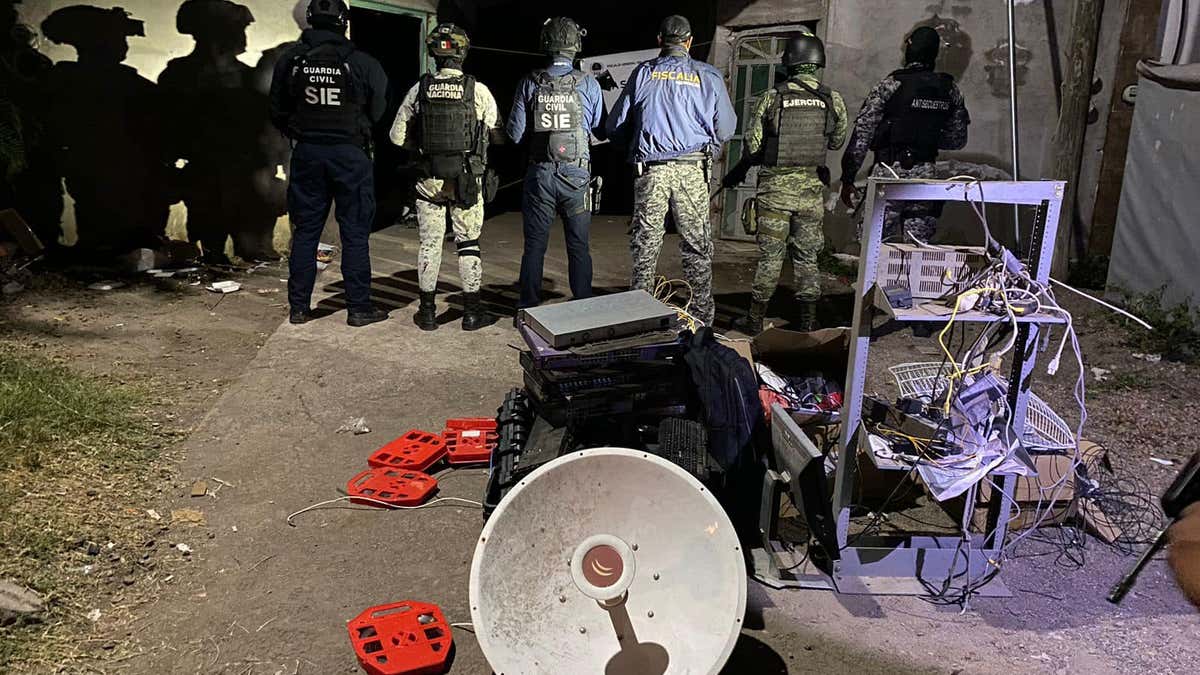
Mexican law enforcement and soldiers dismantle an illegal call center. (Attorney General of the Mexican State of Michoacán)
That’s a raindrop in the ocean
The Courier Journal reporter, Scott Fisher, talked about the cartel scams during a March 13 podcast called “The Excerpt.”
“According to U.S. government officials that I spoke to, we’re talking about hundreds of millions of dollars every single year,” Fisher said.
US WARNING ON MEXICO SPRING BREAK TRAVEL, TOP THREATS FACING AMERICANS
He gave a brief history of the scam, which he said started as a new criminal business venture in 2010, when someone connected to the cartel pitched this idea.
“Being a cartel that is very agile, (the cartel) said, ‘Absolutely.’ And they took over call center after call center, forcing these individuals to work for them. And not only do that, but teach them how to do this and how to do it better and better,” Fisher said.

Mexican law enforcement dismantles illegal internet antennas. (Attorney General of the Mexican State of Michoacán)
The scheme itself is “shockingly sophisticated,” according to the reporter, who’s part of the USA Today Network.
“I mean, we’re talking about individuals, they hire people who speak perfect English in these call centers and they provide what appear to be very legitimate documents,” he said on the podcast. “And these scams can develop incredible ways.
“First, as I mentioned, it can start out with these fees that are required by say the Mexican government, capital gains fees. All of this is in the tens of thousands often, and it just keeps going, but you can have your money as soon as you pay. And that is what keeps them on the hook.”
MEXICAN AUTHORITIES ARREST 6 IN CONNECTION TO GRISLY MACHETE MURDERS IN CANCUN
And they stay off Mexican and U.S. law enforcement’s radar by constantly dropping and creating new shell companies, he said.
Then there’s the stigma of even reporting the scam and admitting to being duped, according to Fisher, which likely means the reported number of cases is just a fraction of the whole operation.
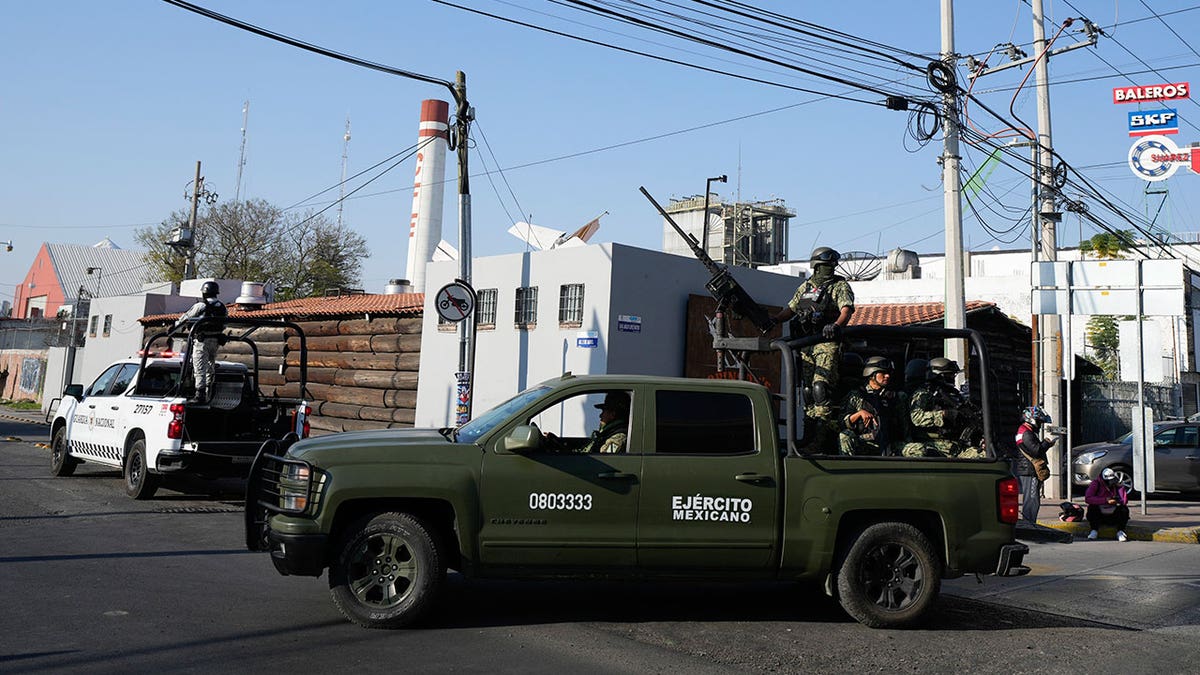
Mexican soldiers drive past a crime scene where a municipal police officer was shot dead, in a neighborhood of Celaya, Feb. 28, 2024. In Guanajuato state, more police were shot to death in 2023 than across the United States. (AP Photo/Fernando Llano)
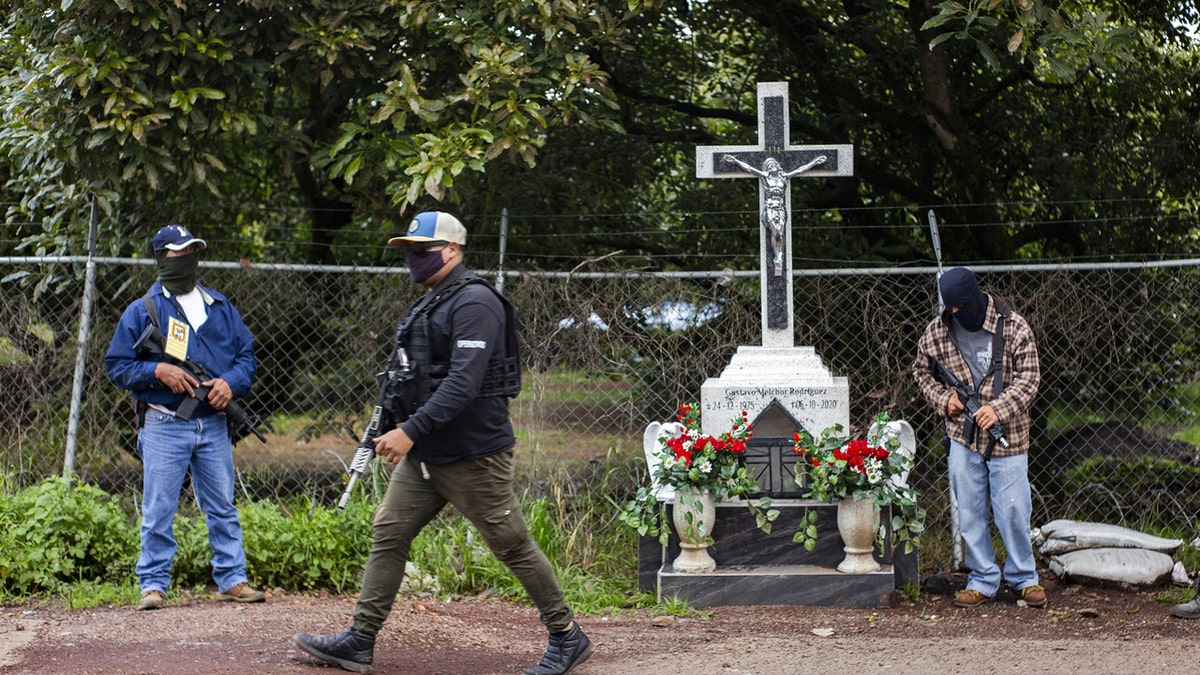
Members of Pueblos Unidos, which began as a self-defense group protecting avocado plantations, on duty in Ario de Rosales, Mexico, on July 8, 2021. (Enrique Castro/AFP via Getty Images)
The U.S. government – as outlined by the FBI bulletin and the sanctions imposed by the federal Treasury – are aware of the scam, which Fisher said mostly targets older Americans, and are “following the money.”
But the cartel seems to always be a step ahead.
In Mexico, “little seems to be done,” Fisher said. “I was told that Mexican banks could do much more to flag these suspect payments that are made to these accounts, to these fraudulent shell companies.
“And in Mexico, there seems to be little motivation to put significant resources toward stopping this scamming of American citizens.”

President Andrés Manuel López Obrador speaks at a military parade in Mexico City on Aug. 13, 2021. (AP Photo/Fernando Llano, File)
What Fisher described is in line with Mexican President Andrés Manuel López Obrador and his administration’s policy to either deny or downplay cartel violence and criminal activity.
He omitted any reference to drugs, crime or the cartels during his September 2023 State of the Union address.
Then he went after a New York Times reporter after publishing a story in February about an investigation into alleged connections with the cartels. He went as far as revealing the reporter’s contact details, including her telephone number.
MEXICAN PRESIDENT CLAIMS FENTANYL IS US PROBLEM, SLAMS CALLS FOR US MILITARY ACTION AGAINST DRUG CARTELS
In April 2023, Obrador ripped the U.S. for an investigation into the Sinaloa Cartel, calling it “abusive, arrogant interference that should not be accepted under any circumstances,” according to a report by the America First Policy Institute (AFPI).
He also said last March that his government was “not going to permit any foreign government to intervene in our territory, much less that a government’s armed forces intervene,” Al Jazeera reported.
Obrador’s office could not immediately be reached for comment.

Police officers keep watch at the scene where authorities found the bodies of two of four Americans kidnapped by gunmen, in Matamoros, Mexico, on March 7, 2023. (Reuters/Daniel Becerril)

Mexican soldiers enter the iron ore mine in the town of Aquila, Mexico, on Aug. 14, 2013. (AP Photo/Agencia Esquema)
FBI’s tips and where to report if you’ve been victimized
In the FBI’s March 2023 bulletin, the bureau released four safety tips to protect yourself and then what to do if you’ve been victimized:
- Be cautious of uninvited telephone calls, texts or emails from anyone interested in your timeshare.
- Research all entities you are in contact with, contact offices independently to confirm if you are speaking to a representative of their company, and enlist the help of a real estate agent or lawyer you trust.
- Scammers will use tactics such as pressure and time-sensitive offers.
- Know that when opportunities appear “too good to be true,” they often are.
If you or anyone you know has fallen victim to a timeshare related scam, file a complaint with the Internet Crime Complaint Center at ic3.gov. Be sure to include any available information including:
- Emails, phone numbers, domains, company names.
- Transaction information even if no funds were lost.
- Details regarding the interaction with the scammers.
Fox News Digital’s Emmett Jones and Mitch Picasso contributed to this report.


